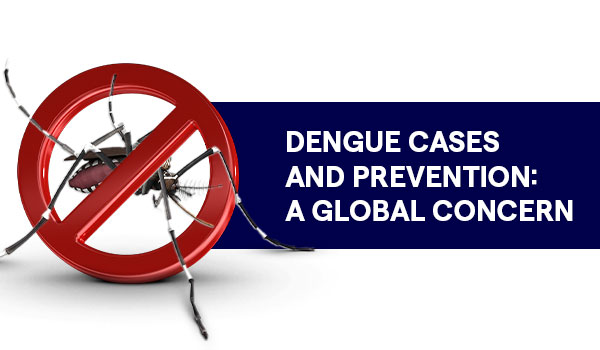
Dengue fever is a common illness transmitted by mosquitos that has caused substantial public health implications across the world. According to the World Health Organization (WHO), an estimated 50 million dengue infections occur each year, with nearly 2.5 billion individuals at risk of contracting the illness. The spread of dengue has been attributed to factors such as urbanization, population growth, climate change, and inadequate vector control measures.
In India, dengue has been a major concern, with a significant increase in the number of cases reported in recent years. According to the National Center for Vector Borne Disease Control, 94198 dengue cases were reported in 2023, with a total of 91 deaths. Kerala has the highest cases, with 9770 and 37 deaths. The government has been implementing various measures to control the spread of dengue, including public awareness campaigns and vector control programs. Individuals must take preventive measures such as eliminating mosquito breeding sites and using insect repellent to reduce the risk of contracting dengue.
Dengue fever is caused by 4 closely related viruses, known as serotypes (DEN1, DEN2, DEN3, and DEN4), which are spread to humans through the bite of infected Aedes mosquitoes, primarily Aedes aegypti.
⦁ Sudden High Fever: The most common symptom of dengue is often an increase in body temperature to 104°F (40°C) or even higher. The fever typically lasts for 2-7 days and follows a biphasic pattern, meaning it might decrease slightly after a few days before rising again.
⦁ Severe Headaches: Dengue fever is often caused by intense headaches, frequently described as severe and throbbing. These headaches can be localized to the forehead or radiate behind the eyes, worsening with eye movement.
⦁ Muscle and Joint Pain: Dengue is known for causing excruciating muscle and joint aches, often described as a breaking or crushing sensation. This widespread pain can significantly limit movement and daily activities.
⦁ Extreme weakness and fatigue: Extreme weakness and fatigue are also common symptoms of dengue fever, making it difficult for individuals to perform even simple tasks. It is important to stay hydrated and rest as much as possible during this time to aid in recovery.
⦁ Nausea and Vomiting: Many people with dengue experience nausea and vomiting, which can be persistent & contribute to dehydration.
⦁ Rash: A rash is a common symptom of dengue fever, appearing as small red spots or patches on the skin. It typically appears 2-5 days after the fever begins. The rash usually starts on the face and upper body before spreading to the extremities.
In addition to these common dengue symptoms, some people also experience:
⦁ Loss of appetite: Dengue can significantly reduce your appetite, making it difficult to stay hydrated and nourished.
⦁ Swollen glands: Lymph nodes, especially in the neck and groin area, may become swollen and tender during a dengue infection.
While most cases of dengue are mild, a small percentage of people develop a severe form known as dengue hemorrhagic fever (DHF). Dengue hemorrhagic fever & dengue shock syndrome are serious forms of the disease that are fatal if not treated promptly. If you or someone you know experiences any of the following warning signs alongside the above symptoms, immediate medical attention is important:
⦁ Severe abdominal pain or tenderness: This can indicate internal bleeding, a sign of DHF.
⦁ Persistent vomiting (three or more times in 24 hours): Excessive vomiting can lead to dehydration and worsen your condition.
⦁ Bleeding from the nose, gums, or skin: This can be a sign of a compromised blood clotting system, a complication of DHF.
⦁ Lethargy, restlessness, or irritability: These changes in mental state can indicate a worsening of the infection.
Prevention of dengue mainly involves controlling the mosquito vector population. This can be done through measures such as reducing mosquito breeding areas (stagnant water), using mosquito repellents, wearing long sleeves and pants, and using mosquito nets.
Treatment of dengue primarily involves supportive care to reduce symptoms and prevent complications. There is no specific treatment for dengue fever, and management focuses on hydration, pain relief, and close monitoring of vital signs. In severe cases of DHF and DSS, timely intervention is crucial to prevent shock, bleeding, and organ failure.
Sir Ganga Ram Hospital best medicine hospital in Delhi is a leading healthcare hospital that provides comprehensive care for patients with dengue fever, including specialized treatment plans, expert medical staff, and advanced diagnostic services.
According to doctors, it is very important to get timely treatment in this situation; otherwise, it will become very difficult to save the patient's life.
Patients with suspected dengue are promptly evaluated through a series of comprehensive assessments, including physical examinations, blood tests, & imaging studies, to confirm the diagnosis, determine disease severity, and tailor individualized treatment plans.
⦁ Intravenous fluid therapy is administered to maintain hydration levels and prevent complications such as dehydration, electrolyte imbalances, and organ dysfunction during dengue fever treatment.
⦁ Medications, such as antipyretics and analgesics, are prescribed to reduce fever and alleviate pain in individuals with dengue fever, aiming to improve comfort and overall well-being during the recovery period.
⦁ Continuous monitoring for potential complications, such as bleeding, plasma leakage, and organ impairment, is essential to promptly address any emerging risks and ensure optimal patient outcomes during dengue treatment. Whether you're experiencing any of the above dengue symptoms, Book an appointment and take the first step towards safeguarding your health against dengue fever.
To know more, book an appointment today.